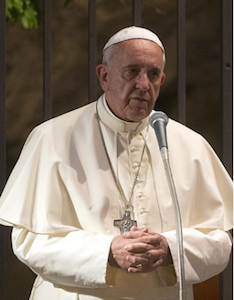Tell the Truth - Pope's Message for World Communications Day 2020

Source: Vatican News
Today, the Feast of St Francis de Sales, Patron Saint of Journalists and Writers, Pope Francis released his annual message for World Communications Day. This year the Holy Father reflects on the Biblical text from Exodus 10:2: That you may tell your children and grandchildren.'
Life becomes history
I would like to devote this year's Message to the theme of storytelling, because I believe that, so as not to lose our bearings, we need to make our own the truth contained in good stories. Stories that build up, not tear down; stories that help us rediscover our roots and the strength needed to move forward together. Amid the cacophony of voices and messages that surround us, we need a human story that can speak of ourselves and of the beauty all around us. A narrative that can regard our world and its happenings with a tender gaze. A narrative that can tell us that we are part of a living and interconnected tapestry. A narrative that can reveal the interweaving of the threads which connect us to one another.
1. Weaving stories
Human beings are storytellers. From childhood we hunger for stories just as we hunger for food. Stories influence our lives, whether in the form of fairy tales, novels, films, songs, news, even if we do not always realize it. Often we decide what is right or wrong based on characters and stories we have made our own. Stories leave their mark on us; they shape our convictions and our behaviour. They can help us understand and communicate who we are.
We are not just the only beings who need clothing to cover our vulnerability (cf. Gen 3: 21); we are also the only ones who need to be "clothed" with stories to protect our lives. We weave not only clothing, but also stories: indeed, the human capacity to "weave" (Latin texere) gives us not only the word textile but also text. The stories of different ages all have a common "loom": the thread of their narrative involves "heroes", including everyday heroes, who in following a dream confront difficult situations and combat evil, driven by a force that makes them courageous, the force of love. By immersing ourselves in stories, we can find reasons to heroically face the challenges of life.
Human beings are storytellers because we are engaged in a process of constant growth, discovering ourselves and becoming enriched in the tapestry of the days of our life. Yet since the very beginning, our story has been threatened: evil snakes its way through history.
2. Not all stories are good stories
"When you eat of it … you will be like God" (cf. Gen 3:4): the temptation of the serpent introduces into the fabric of history a knot difficult to undo. "If you possess, you will become, you will achieve…" This is the message whispered by those who even today use storytelling for purposes of exploitation. How many stories serve to lull us, convincing us that to be happy we continually need to gain, possess and consume. We may not even realize how greedy we have become for chatter and gossip, or how much violence and falsehood we are consuming. Often on communication platforms, instead of constructive stories which serve to strengthen social ties and the cultural fabric, we find destructive and provocative stories that wear down and break the fragile threads binding us together as a society. By patching together bits of unverified information, repeating banal and deceptively persuasive arguments, sending strident and hateful messages, we do not help to weave human history, but instead strip others of their dignity.
But whereas the stories employed for exploitation and power have a short lifespan, a good story can transcend the confines of space and time. Centuries later, it remains timely, for it nourishes life.
In an age when falsification is increasingly sophisticated, reaching exponential levels (as in deepfake), we need wisdom to be able to welcome and create beautiful, true and good stories. We need courage to reject false and evil stories. We need patience and discernment to rediscover stories that help us not to lose the thread amid today's many troubles. We need stories that reveal who we truly are, also in the untold heroism of everyday life.
3. The Story of stories
Sacred Scripture is a Story of stories. How many events, peoples and individuals it sets before us! It shows us from the very beginning a God who is both creator and narrator. Indeed, God speaks his word and things come into existence (cf. Gen 1). As narrator, God calls things into life, culminating in the creation of man and woman as his free dialogue partners, who make history alongside him. In one of the Psalms, the creature tells the creator: "For you formed my inward parts; you knitted me together in my mother's womb. I praise you, for I am fearfully and wonderfully made … My frame was not hidden from you, when I was being made in secret, intricately woven in the depths of the earth" (139:13-15). We are not born complete, but need to be constantly "woven", "knitted together". Life is given to us as an invitation to continue to weave the "wonderful" mystery that we are.
The Bible is thus the great love story between God and humanity. At its centre stands Jesus, whose own story brings to fulfilment both God's love for us and our love for God. Henceforth, in every generation, men and women are called to recount and commit to memory the most significant episodes of this Story of stories, those that best communicate its meaning.
The title of this year's Message is drawn from the Book of Exodus, a primordial biblical story in which God intervenes in the history of his people. When the enslaved children of Israel cry out to Him, God listens and remembers: "God remembered His covenant with Abraham, with Isaac and with Jacob. God saw the people of Israel - and God knew" (Ex 2: 24-25). God's memory brings liberation from oppression through a series of signs and wonders. The Lord then reveals to Moses the meaning of all these signs: "that you may tell in the hearing of your children and grandchildren… what signs I have done among them, that you may know that I am the Lord" (Ex 10:2). The Exodus experience teaches us that knowledge of the Lord is handed down from generation to generation mainly by telling the story of how he continues to make himself present. The God of life communicates with us through the story of life.
Jesus spoke of God not with abstract concepts, but with parables, brief stories taken from everyday life. At this point life becomes story and then, for the listener, story becomes life: the story becomes part of the life of those who listen to it, and it changes them.
The Gospels are also stories, and not by chance. While they tell us about Jesus, they are "performative"[1]; they conform us to Jesus. The Gospel asks the reader to share in the same faith in order to share in the same life. The Gospel of John tells us that the quintessential storyteller - the Word - himself becomes the story: "God's only Son, who is at the Father's side, has made him known" (Jn 1: 18). The original verb, exegésato, can be translated both as "revealed" and "recounted". God has become personally woven into our humanity, and so has given us a new way of weaving our stories.
4. An ever renewed story
The history of Christ is not a legacy from the past; it is our story, and always timely. It shows us that God was so deeply concerned for mankind, for our flesh and our history, to the point that he became man, flesh and history. It also tells us that no human stories are insignificant or paltry. Since God became story, every human story is, in a certain sense, a divine story. In the history of every person, the Father sees again the story of his Son who came down to earth. Every human story has an irrepressible dignity. Consequently, humanity deserves stories that are worthy of it, worthy of that dizzying and fascinating height to which Jesus elevated it.
"You" - Saint Paul wrote - "are a letter from Christ delivered by us, written not with ink but with the Spirit of the living God, not on tablets of stone but on tablets of human hearts" (2 Cor 3:3). The Holy Spirit, the love of God, writes within us. And as he writes within us, he establishes goodness in us and constantly reminds us of it. Indeed, to "re-mind" means to bring to mind, to "write" on the heart. By the power of the Holy Spirit, every story, even the most forgotten one, even the one that seems to be written with the most crooked lines, can become inspired, can be reborn as a masterpiece, and become an appendix to the Gospel. Like the Confessions of Augustine. Like A Pilgrim's Journey of Ignatius. Like The Story of a Soul of Saint Therese of the Child Jesus. Like The Betrothed, like The Brothers Karamazov. Like countless other stories, which have admirably scripted the encounter between God's freedom and that of man. Each of us knows different stories that have the fragrance of the Gospel, that have borne witness to the Love that transforms life. These stories cry out to be shared, recounted and brought to life in every age, in every language, in every medium.
5. A story that renews us
Our own story becomes part of every great story. As we read the Scriptures, the stories of the saints, and also those texts that have shed light on the human heart and its beauty, the Holy Spirit is free to write in our hearts, reviving our memory of what we are in God's eyes. When we remember the love that created and saved us, when we make love a part of our daily stories, when we weave the tapestry of our days with mercy, we are turning another page. We no longer remain tied to regrets and sadness, bound to an unhealthy memory that burdens our hearts; rather, by opening ourselves to others, we open ourselves to the same vision of the great storyteller. Telling God our story is never useless: even if the record of events remains the same, the meaning and perspective are always changing. To tell our story to the Lord is to enter into his gaze of compassionate love for us and for others. We can recount to him the stories we live, bringing to him the people and the situations that fill our lives. With him we can re-weave the fabric of life, darning its rips and tears. How much we, all of us, need to do exactly this!
With the gaze of the great storyteller - the only one who has the ultimate point of view - we can then approach the other characters, our brothers and sisters, who are with us as actors in today's story. For no one is an extra on the world stage, and everyone's story is open to possible change. Even when we tell of evil, we can learn to leave room for redemption; in the midst of evil, we can also recognize the working of goodness and give it space.
So it is not a matter of simply telling stories as such, or of advertising ourselves, but rather of remembering who and what we are in God's eyes, bearing witness to what the Spirit writes in our hearts and revealing to everyone that his or her story contains marvellous things. In order to do this, let us entrust ourselves to a woman who knit together in her womb the humanity of God and, the Gospel tells us, wove together the events of her life. For the Virgin Mary "treasured all these things and pondered them in her heart" (Lk 2: 19). Let us ask for help from her, who knew how to untie the knots of life with the gentle strength of love:
O Mary, woman and mother, you wove the divine Word in your womb, you recounted by your life the magnificent works of God. Listen to our stories, hold them in your heart and make your own the stories that no one wants to hear. Teach us to recognize the good thread that runs through history. Look at the tangled knots in our life that paralyze our memory. By your gentle hands, every knot can be untied. Woman of the Spirit, mother of trust, inspire us too. Help us build stories of peace, stories that point to the future. And show us the way to live them together.
Rome, at Saint John Lateran, 24 January 2020, the Memorial of Saint Francis de Sales
[1] Cf. Benedict XVI, Encyclical Letter Spe Salvi, 2: "The Christian message was not only 'informative' but 'performative'. That means: the Gospel is not merely a communication of things that can be known-it is one that makes things happen and is life-changing".


















